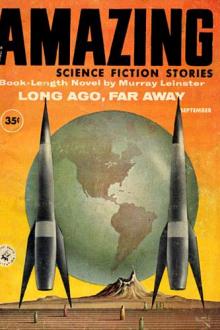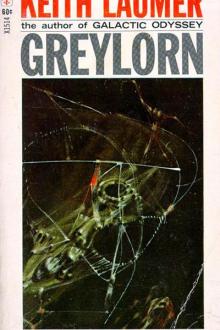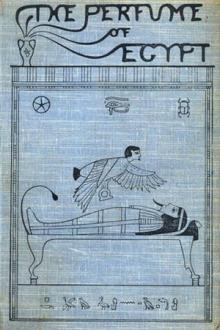Genre Fiction. Page - 235

magining that, I'm right there with you."
He went back to the main building to get Gail and Captain Moggs. They went out to the 'copter hangar together.
"I've talked to the radar and loran operator," said Soames. "I explained that you wanted to see some crevasses from the air, and I'd be wandering around looking for them on the way to the rookery. He will check on us every fifteen minutes, anyhow."
* * * * *
The 'copter went up the long, sloping, bulldozed snow-ramp. Soames checked his radio contact. He nodded. The engines hummed and roared and bellowed, and the ship lifted deliberately and floated away over the icy waste.
The little helicopter was very much alone above a landscape which had never known a growing thing.
Soames kept in radar contact and when he was ready he told the base, "I'm going down now, hunting crevasses."
He let the 'copter descend. The waste was featureless, then and for a seemingly interminable time afterward. Then his estimated positio

he parish sexton. Bob Martin was held much in awe bytruant boys who sauntered into the churchyard on Sundays, to read thetombstones, or play leap frog over them, or climb the ivy in search ofbats or sparrows' nests, or peep into the mysterious aperture under theeastern window, which opened a dim perspective of descending stepslosing themselves among profounder darkness, where lidless coffins gapedhorribly among tattered velvet, bones, and dust, which time andmortality had strewn there. Of such horribly curious, and otherwiseenterprising juveniles, Bob was, of course, the special scourge andterror. But terrible as was the official aspect of the sexton, andrepugnant as his lank form, clothed in rusty, sable vesture, his small,frosty visage, suspicious grey eyes, and rusty, brown scratch-wig, mightappear to all notions of genial frailty; it was yet true, that BobMartin's severe morality sometimes nodded, and that Bacchus did notalways solicit him in vain.
Bob had a curious mind, a memory well st

d he had worked on it a design of the village in which they lived. Mary's idea now was to fill this basket with flowers, and to offer it to the young Countess as her birthday present. Her father readily fell in with the plan, and added a finishing touch to it by weaving Amelia's name in on one side of the basket and the Count's coat-of-arms on the other.
The long-expected day arrived, and early in the morning Mary gathered the freshest and most beautiful roses, the richest pinks, and other flowers of beautiful colours. She picked out some green branches full of leaves, and arranged them in the basket, so that all the colours, though perfectly distinct, were sweetly and delicately blended. A light garland composed of rosebuds and moss was passed around the basket, and Amelia's name could be distinctly read enclosed in a coronet of forget-me-nots. The basket when completed was a thing of uncommon beauty.
When Mary went to the Castle with her basket-present, the young Countess Amelia was sitting at

hin gold chain with an object attached to it. He glanced at the object and then took off his spectacles to examine it more narrowly. 'What's the history of this?' he asked. 'Odd enough,' was the answer. 'You know the yew thicket in the shrubbery: well, a year or two back we were cleaning out the old well that used to be in the clearing here, and what do you suppose we found?'
'Is it possible that you found a body?' said the visitor, with an odd feeling of nervousness.
'We did that: but what's more, in every sense of the word, we found two.'
'Good Heavens! Two? Was there anything to show how they got there? Was this thing found with them?'
'It was. Amongst the rags of the clothes that were on one of the bodies. A bad business, whatever the story of it may have been. One body had the arms tight round the other. They must have been there thirty years or more--long enough before we came to this place. You may judge we filled the well up fast enough. Do you make anything of what's cut o

ladys Maud cried, because she had taken a sudden dislike to the village idiot; and Mike settled himself in the corner and opened a magazine.
He was alone in the carriage. Bob, who had been spending the last week of the holidays with an aunt further down the line, was to board the train at East Wobsley, and the brothers were to make a state entry into Wrykyn together. Meanwhile, Mike was left to his milk chocolate, his magazines, and his reflections.
The latter were not numerous, nor profound. He was excited. He had been petitioning the home authorities for the past year to be allowed to leave his private school and go to Wrykyn, and now the thing had come about. He wondered what sort of a house Wain's was, and whether they had any chance of the cricket cup. According to Bob they had no earthly; but then Bob only recognised one house, Donaldson's. He wondered if Bob would get his first eleven cap this year, and if he himself were likely to do anything at cricket. Marjory had faithfully reported e

a few weeks before, but the idea had spread through the crew like wildfire. Now, I couldn't afford drastic action, or risk forcing a blowup by arresting ringleaders. I had to baby the situation along with an easy hand and hope for good news from the Survey Section. A likely find now would save us.
There was still every reason to hope for success in our search. To date all had gone according to plan. We had followed the route of Omega as far as it had been charted, and then gone on, studying the stars ahead for evidence of planets. We had made our first finds early in the fourth year of the voyage. It had been a long tedious time since then of study and observation, eliminating one world after another as too massive, too cold, too close to a blazing primary, too small to hold an atmosphere. In all we had discovered twelve planets, of four suns. Only one had looked good enough for close observation. We had moved in to televideo range before realizing it was an all-sea world.
Now we had five new m

ll the knowledge of good and evil that God had perhaps given her, but that no one had ever thought of developing. I shall always remember her, as she passed along the boulevards almost every day at the same hour, accompanied by her mother as assiduously as a real mother might have accompanied her daughter. I was very young then, and ready to accept for myself the easy morality of the age. I remember, however, the contempt and disgust which awoke in me at the sight of this scandalous chaperoning. Her face, too, was inexpressibly virginal in its expression of innocence and of melancholy suffering. She was like a figure of Resignation.
One day the girl's face was transfigured. In the midst of all the debauches mapped out by her mother, it seemed to her as if God had left over for her one happiness. And why indeed should God, who had made her without strength, have left her without consolation, under the sorrowful burden of her life? One day, then, she realized that she was to have a child, and all that re

looking as though it had been but just torn off. One side of the paper was entirely blank -- or at least, if there ever had been any writing upon it, it had disappeared through the influence of time and damp; on the other were some blurred and indistinct characters, so faded as to be scarcely distinguishable, and, in a bold hand-writing in fresh black ink the two letters "Ra".
Since the ink with which these letters were written corresponded exactly with that which I was in the habit of using, I could hardly doubt that they had been written at my table, and were the commencement of some explanation that the spectre had wished, but for some reason found himself unable, to make. Why he should have taken the trouble to bring his own paper with him I could not understand, but I inferred that probably some mystery was hidden beneath those undecipherable yellow marks, so I turned all my attention to them. After patient and long-continued effort, however, I was unable to make anything like sense out of them,

ig chief," went on Jones, "me go far north--Land of LittleSticks--Naza! Naza! rope musk-ox; rope White Manitou of GreatSlave Naza! Naza!"
"Naza!" replied the Navajo, pointing to the North Star; "no--no."
"Yes me big paleface--me come long way toward setting sun--gocross Big Water--go Buckskin--Siwash--chase cougar."
The cougar, or mountain lion, is a Navajo god and the Navajoshold him in as much fear and reverence as do the Great SlaveIndians the musk-ox.
"No kill cougar," continued Jones, as the Indian's bold featureshardened. "Run cougar horseback--run long way--dogs chase cougarlong time--chase cougar up tree! Me big chief--me climbtree--climb high up--lasso cougar--rope cougar--tie cougar alltight."
The Navajo's solemn face relaxed
"White man heap fun. No."
"Yes," cried Jones, extending his great arms. "Me strong; me ropecougar--me tie cougar; ride off wigwam, keep cougar alive."
"No," replied the savage vehemently.
"Yes," protested Jones, nodding earnestly.
"No," a

ied; in which the narrator of the tale finds himself unexpectedly involved both on its ruthless and its delicate side.
"Falk" shares with one other of my stories ("The Return" in the "Tales of Unrest" volume) the distinction of never having been serialized. I think the copy was shown to the editor of some magazine who rejected it indignantly on the sole ground that "the girl never says anything." This is perfectly true. From first to last Hermann's niece utters no word in the tale -- and it is not because she is dumb, but for the simple reason that whenever she happens to come under the observation of the narrator she has either no occasion or is too profoundly moved to speak. The editor, who obviously had read the story, might have perceived that for himself. Apparently he did not, and I refrained from pointing out the impossibility to him because, since he did not venture to say that "the girl" did not live, I felt no concern at his indignation.
All the other stories were serialized. The "Typh